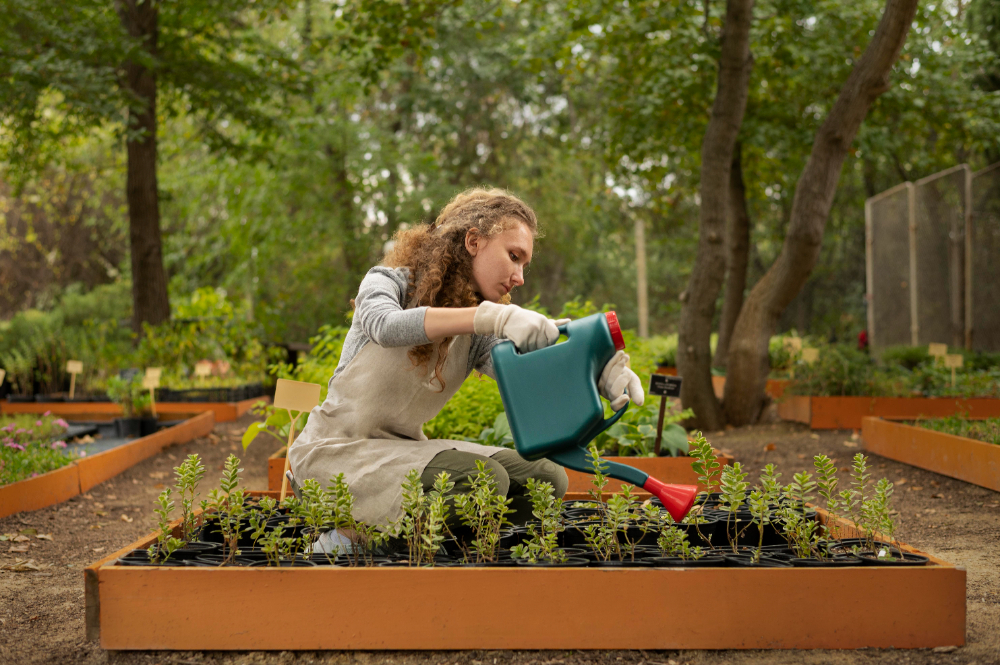What Is Sustainable Gardening and Why It Matters
- Dec 18, 2024
 Sustainable gardening is a popular concept that is rapidly gaining ground among homeowners across the country. Most people know that it is an eco-friendly concept which means that it is a good thing. But how many of us truly understand what exactly sustainability is and why it is so important when it comes to gardening and landscaping?
Sustainable gardening is a popular concept that is rapidly gaining ground among homeowners across the country. Most people know that it is an eco-friendly concept which means that it is a good thing. But how many of us truly understand what exactly sustainability is and why it is so important when it comes to gardening and landscaping?
The word “sustainable” means that which can be nourished and protected so that its existence continues. With gardening/landscaping, the use of sustainable eco-friendly landscaping practices means that the soil is nourished so that the plants that grow in it can continue to thrive without causing any environmental damage.
The Five Basics of Sustainable Gardening
The concept of sustainable gardening revolves around:
1. Supporting the eco-system
2. Having little or no negative impact on the earth and the area around the garden
3. Working with nature instead of against it by not using artificially created or supported methods to achieve short-term growth
There are five basic objectives of sustainable gardening:
- Protecting and Enhancing Soil Health: Soil contains organisms that convert organic matter and minerals into nutrients that plants need to grow. This means that the use of chemical insecticides and fertilizers that destroy these organisms must be replaced by those that are made from natural substances. What is given or added to the garden must not replace its natural ability to grow with substances that create unnatural short-term growth as it could end in long-term environmental damage.
- Using Water as Efficiently as Possible: Water, even in regions where it appears to be plentiful, is a limited resource. Plants do need water to grow and watering a garden is essential to its health and well-being. But the use of water must be monitored. Not only is excessive watering bad for a garden but wasting water leads to serious environmental damage.
Also Read: Simple Eco-Friendly Landscaping Practices
- Using Native Plants: The benefits of native plants in landscaping are many. Native plants have evolved to effectively deal with the environmental limitations that exist in their regions. They require less water and fertilization than plants from other geographical regions. These plants also support the existence of insects, animals, and pollinators that live in the same region and which are essential to the long-term health and vitality of the garden.
- Supporting the Natural Ecosystem: Wilderness is disappearing at ever-increasing rates. Using native plants for a landscape supports the local plant and insect/animal environment.
- Avoiding the Use of Harmful Materials and Tools: Using power tools and gas-powered mowers increases noise and air pollution. Certain hardscaping materials can damage the environment. Even those that claim to be environmentally neutral may have an indirect negative impact.
Sustainable Gardens Support A Sustainable World
The satisfaction that comes from a sustainable garden enhances the already great pleasure the garden provides. Being sustainable is not expensive or difficult, but it does require a knowledge of horticulture, design capabilities, and knowing what plants and materials to use and where and how they should be placed in the garden. A landscaping professional with expert knowledge of all this and more is the best resource for creating a garden that is sustainable, beautiful, and functional.
Frequently Asked Questions
1. What is sustainable gardening?
Sustainable gardening is an eco-friendly landscaping practice that focuses on nourishing the soil and supporting the ecosystem, allowing plants to thrive naturally without causing environmental damage.
2. What are the benefits of native plants in landscaping?
Native plants require less water and fertilization, adapt to local environmental conditions, and support pollinators, insects, and wildlife in the region, contributing to a healthy ecosystem.
3. How can sustainable gardening protect soil health?
Sustainable gardening avoids chemical insecticides and fertilizers, instead relying on natural substances that preserve soil organisms. These organisms convert organic matter and minerals into nutrients essential for plant growth.
4. Why is efficient water usage important in gardening?
Water is a limited resource, and excessive watering can harm plants and waste valuable resources. Sustainable gardening ensures water is used efficiently to maintain plant health and reduce environmental impact.
5. How does sustainable gardening support the ecosystem?
It works with nature by using native plants, avoiding harmful materials, and minimizing the use of tools that create noise or air pollution. This helps maintain local biodiversity and reduces environmental damage.
6. What are the key objectives of sustainable gardening?
🞍 Protecting soil health
🞍 Using water efficiently
🞍 Incorporating native plants
🞍 Supporting the natural ecosystem
🞍 Avoiding harmful materials and tools
7. How can a professional landscaper help with sustainable gardening?
A landscaping professional can guide you in choosing the right plants, materials, and designs to create a garden that is sustainable, functional, and visually appealing.














